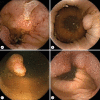Colon Capsule Endoscopy: Indications, Findings, and Complications - Data from a Prospective German Colon Capsule Registry Trial (DEKOR)
- PMID: 32549533
- PMCID: PMC7939783
- DOI: 10.5946/ce.2020.049
Colon Capsule Endoscopy: Indications, Findings, and Complications - Data from a Prospective German Colon Capsule Registry Trial (DEKOR)
Abstract
Background/aims: Reliable and especially widely accepted preventive measures are crucial to further reduce the incidence of colorectal cancer (CRC). Colon capsule endoscopy (CCE) might increase the screening numbers among patients unable or unwilling to undergo conventional colonoscopy. This registry trial aimed to document and determine the CCE indications, findings, complications, and adverse events in outpatient practices and clinics throughout Germany.
Methods: Patients undergoing CCE between 2010 and 2015 were enrolled in this prospective multicenter registry trial at six German centers. Patient demographics, outcomes, and complications were evaluated.
Results: A total of 161 patients were included. Of the CCE evaluations, 111 (68.9%) were considered successful. Pathological findings in the colon (n=92, 60.1%) and in the remaining gastrointestinal tract (n=38, 24.8%) were recorded. The main finding was the presence of polyps (n=52, 32.3%). Furthermore, five carcinomas (3.1%) were detected and histologically confirmed later. Adequate bowel cleanliness was more likely to be achieved in the outpatient setting (p<0.0001). Interestingly, 85 patients (55.6%) chose to undergo CCE based on personal motivation.
Conclusion: CCE seems to be a reliable and safe endoscopic tool for screening for CRC and detecting other diseases. Its patient acceptance and feasibility seems to be high, especially in the outpatient setting.
Keywords: Colonic neoplasms; Control; Endoscopy; Prevention; Registries; Safety.
Conflict of interest statement
Figures
References
-
- Welch HG, Robertson DJ. Colorectal cancer on the decline--why screening can’t explain it all. N Engl J Med. 2016;374:1605–1607. - PubMed
-
- Ferlay J, Soerjomataram I, Dikshit R, et al. Cancer incidence and mortality worldwide: sources, methods and major patterns in GLOBOCAN 2012. Int J Cancer. 2015;136:E359–E386. - PubMed
LinkOut - more resources
Full Text Sources
Other Literature Sources


